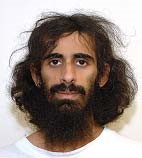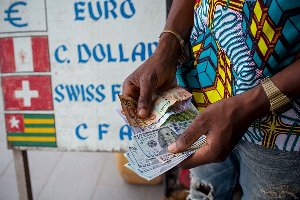It is emerging that, instead of the two GITMO detainees that Ghanaians were made to believe were booked for Ghana, based on negotiations with the American government, three were really billed to have arrived in Ghana.
Interestingly, one decided not to come to Ghana but be returned to Saudi Arabia because of cultural reasons, one of them being language.
The detainee, according to documents in the possession of DAYBREAK, was a Yemeni named Abdul Rahman Mohammed Saleh Nasri.
Cited in the report as players for Ghana in the controversial deal were Lieutenant General Henry Smith, then Ghana’s Ambassador to the United States of America, Mrs Amma A. Twum-Amoah, then Head of Chancery and Brigadier-General SM. Adams, then Defence, Military, Naval and Air Attache (DMNAA).
Smith and the two officers from Ghana reported at the Guantanamo Bay in a US Air Force plane on Wednesday, January 21, 2015 to interview the three detainees, namely, Abdul Rahman, Mohammed Saleh Nasri, Mohammed Khalid Salih Al-Dhuby and Mahmoud Omar Mohammed Bin Atef, who had been preselected, for 30 minutes each, through interpreters.
Find below excerpts of the Report and profile of the detainee
Profile of Abdul Rahman Mohammad Saleh Nasir
Abdul Rahman Mohammad Saleh Nasir, otherwise known as inmate number 115, is a thirty-five (35) year old Yemeni born in Saudi Arabia and has been in the Camp since 2002.
He is single and a middle school dropout with no skills.
He has a brother and Three sisters who are all living in Saudi Arabia.
Of his parents, his father was dead and he had no idea whether his mother was alive or not.
Though majority of his relatives lived in Saudi Arabia, a few were in Yemen and had visited them a couple of times.
Mr Nasir does not speak any English at all. He left Saudi Arabia for Afghanistan in 2001, through Syria and Iraq.
He wears a beard, a moustache and a pair of spectacles.
Health
Mr Nasir has a number of health conditions and was classified in 2008 as high-risk detainee, health-wise.
He said he had skin disorder and blood allergies, weak vision, acid reflux and had been coughing for a while.
According to him, all his ailments were prison related.
Threat Assessment
According to official US Government documents, there is no indication that Mr Nasir was involved in or facilitated terrorist acts against the US, its partners or allies.
He admitted having received military-type training in small arms, including assembling, disassembling and firing of Kalashnikov rifle, PK machine gun and rocket-propelled grenades (RPGs).
He also received training on the front lines in Afghanistan.
He is not believed to have served in any leadership or operational planning position in either al-Qaida or Taliban. However, he has several connections to the two organizations.
He was arrested in Afghanistan in 2001 and transferred to the Guantanamo Bay Detention Camp in June 2002.
Mr. Nasir was assessed as being of medium risk in 2008.
He had 54 reports of disciplinary infraction, including inciting and participating in mass disturbances.
He was accommodated in a single cell unit.
Interview
Mr Nasir looked sickly in appearance and seemed to be suffering from chronic running nose and disclosed that he has been on hunger strike close to 2 years.
He confirmed his name, age, nationality and other background information.
He disclosed that he went to Afghanistan to join the jihad on his own volition, was a guest of the Taliban and decided to live there.
Mr Nasir indicated that though he began communicating with his family once every 2 months, four (4) years ago, he stopped telephone calls with them, as a form of protest against conditions in the camp, over a year ago.
On the issue of the offer of asylum by the Government of Ghana, Mr Nasir indicated that his wish was to return to Saudi Arabia where he was born and had lived his entire life.
Even if the relocation was for a few years, he did not want to be separated from his family, so had no intention of going to Ghana.
From his experience with Ghanaians in Saudi Arabia, he knew them to be nice and kind, however, he had never been to Africa and by his very nature, it was going to be difficult for him to blend in anywhere else.
He also cited language limitation as a handicap, since he spoke only Arabic. He was quick to add though, that he had nothing against the country, Ghana.
NB: Abdul Rahman Mohamed Saleh Naser was transferred to Saudi Arabia on April 16, 2016, by US authorities.
General News of Tuesday, 6 February 2018
Source: DAYBREAK
REVEALED: Government accepted 3 GITMO detainees but third refused Ghana
 Abdul Rahman Mohamed Saleh Naser
Abdul Rahman Mohamed Saleh Naser
















